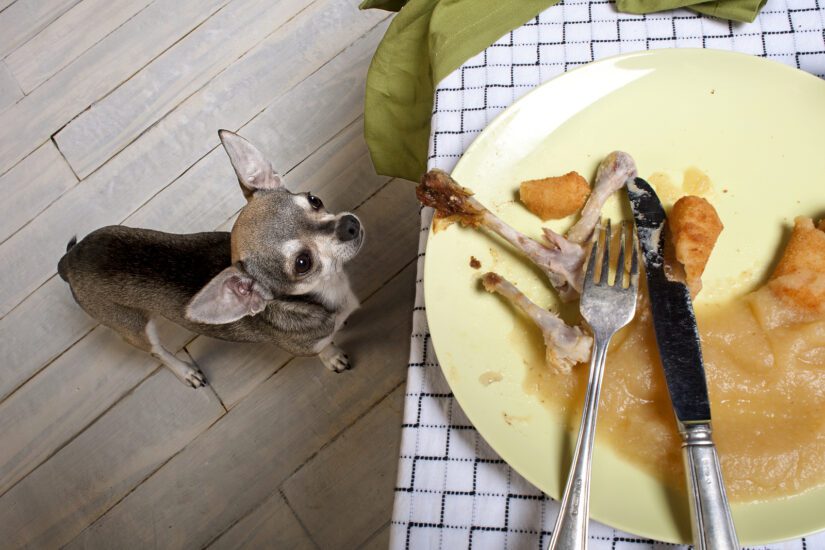People food isn’t always good for your canine companion, no matter how much your pup might beg for it. It’s best to refrain from sharing your meals and beverages with your dog, especially when it comes to certain foods. Here’s a list of items to review and be aware of to keep your canine safe from toxins.

What to avoid:
- Alcohol – Alcohol can cause intoxication, lack of coordination, poor breathing, abnormal acidity and potentially even a coma or death.
- Apple seeds – The casing of apple seeds are toxic to a dog because they contain a natural chemical (amygdalin) that releases cyanide when digested.
- Cooked bones (or antlers) – When it comes to bones, the danger is that cooked bones can easily splinter when chewed by your dog; the splinters can cause damage when chewed and/or swallowed. Bones can also crack or break your dog’s teeth.
- Candy and chewing gum – Not only does candy contain sugar, but it often contains xylitol, which can lead to the over-release of insulin, kidney failure, and worse.
- Chocolate – Chocolate usually contains caffeine as well as theobromine and theophylline, which can be toxic and cause panting, vomiting and diarrhea, and/or damage your dog’s heart and nervous systems.
- Citrus oil extracts – Can cause vomiting.
- Coffee – Caffeine can cause death if enough is ingested by your pet.
- Corn on the cob – While not toxic, the cob can get lodged in the small intestine, and if it’s not removed surgically, can prove fatal to your dog.
- Raw fish – The primary fish that you need to be careful about are salmon and trout. Raw salmon can be fatal to dogs if the fish is infected with a certain parasite.
- Garlic – Garlic is related to onions, which are toxic for dogs.
- Grapes and raisins – Grapes contain a toxin that can cause severe liver damage and kidney failure.
- Hops – This beer ingredient can be bad for your dog. The consumption of hops cause panting, an increased heart rate, fever, seizures, and even death.
- Macadamia nuts – These contain a toxin that can inhibit locomotory activities, resulting in weakness, panting, swollen limbs, and tremors as well as possible damage to your canine’s digestive, nervous, and muscle systems.
- Marijuana and edibles containing cannabis-infused butter or oil – Marijuana, if ingested, can adversely affect your dog’s nervous system and heart rate. Products made with concentrated THC (the psychoactive component in cannabis), such as cannabis butter, are often very attractive to dogs but are even more dangerous and can cause seizures, coma, and even death. Edibles can also contain chocolate or xylitol, which can have additional harmful effects.
- “Magic” mushrooms – While not all mushrooms are harmful, mushrooms used for human recreational use contain psilocybin and psilocin which are structurally related to LSD. Symptoms may include vocalization, dilation of the pupils, loss of balance and coordination, racing heartbeat, disorientation, increased body temperature and anxiety. As these types of mushrooms have a bitter taste, they are often masked in chocolate, xylitol, or alcohol, which can have additional toxic consequences.
- Shelled nuts – Although not toxic, one should never feed a dog nuts that are still in the shell as this can cause intestinal blockage.
- Onions and chives – These contain disulfides and sulfoxides (thiosulphate), both of which can cause anemia and damage red blood cells.
- Persimmons, peaches and plums– Peach pits can be a choking hazard, and seeds can be toxic.
- Rhubarb and tomato leaves – These contain oxalates, which can adversely affect digestive, nervous, and urinary systems.
- Salt – just like humans, excessive salt is not good for your dog.
- Tobacco– Nicotine can damage your pet’s digestive and nervous systems, increase their heart rate, make them pass out, and ultimately result in death.
- Yeast (on its own or in dough) – Yeast rises, whether in your dog’s stomach or not, which can cause gas and discomfort.
Should you suspect your dog has ingested something toxic, call your veterinarian or an emergency veterinary clinic immediately. How quickly treatment is started can mean the difference between life and death.
Extra Resources:
- Poison prevention: Household hazards
- What fruits can my dog eat?
- Beware of these 5 dog park dangers
- Avoid a catastrophe: Foods that spell trouble for your cat
Get updates from the BC SPCA
Want to receive more pet tips like this, right in your inbox? Use the form below to subscribe for updates.
The BC SPCA uses your personal information to update you on our work for animals as well as for advertising and analytics purposes. More information on uses and how to opt-out can be found in our Privacy Policy.
